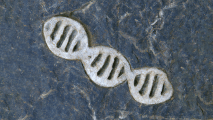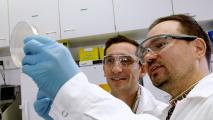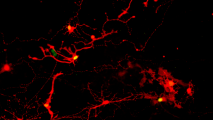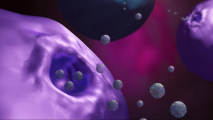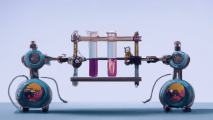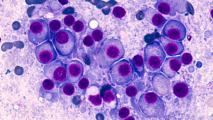
Biotech
Human history has been all but defined by death and disease, plague and pandemic. Advancements in 20th century medicine changed all of that. Now advancements in 21st century medicine promise to go even further. Could we bring about an end to disease? Reverse aging? Give hearing to the deaf and sight to the blind? The answer may be yes. And soon.
More
Resurrecting a 2.6 billion-year-old ancient CRISPR system
Researchers have resurrected an ancient CRISPR system 2.6 billion years old, capable of editing genes in the modern day.
New killer CRISPR system is unlike any scientists have seen
CRISPR-Cas12a2 — a system that causes cells to self-destruct — could lead to new cancer treatments, better diagnostic tests, and more.
Google sister company aims to eradicate dengue from a tropical country
Verily, owned by Google parent company Alphabet, believes it can eliminate Singapore’s dengue problem.
The first ever honey bee vaccine has arrived
The USDA has conditionally approved a honey bee vaccine to protect the important insects from American foulbrood, a brutal bacterial infection.
Lab-grown retinas move toward human trials
Lab-grown eye cells have demonstrated an ability to communicate, a huge milestone along the path to using them to reverse blindness.
Chickenpox and shingles virus lying dormant in your neurons can reactivate and increase your risk of stroke
People with shingles have an approximately 80% higher risk of stroke than those without the disease, and researchers want to know why.
A single injection of gene therapy made old mice live 7% longer
Biotech startup Rejuvenate Bio says it has extended the lives of elderly mice by 7% using a technique called “partial reprogramming.”
FDA approves new Alzheimer’s medication
Lecanemab, a new Alzheimer’s medication shown to slow cognitive decline in patients, has been granted accelerated approval by the FDA.
Artificial penis tissue restores erections in injured pigs
Artificial penis tissue that restored erections in injured pigs might one day do the same for people with erectile dysfunction.
Mother’s mitochondria used to treat her child’s rare genetic disorder
A new therapy that treats children with rare mtDNA mutations using mitochondria sourced from their mothers has now been tested in patients.
New mRNA universal flu vaccine against all known subtypes takes promising first steps
A new universal flu vaccine candidate that uses mRNA to target all known flu subtypes looks promising in animal models.
New stem cell patches could repair babies’ heart defects permanently
Stem cell patches under development in the UK might allow surgeons to permanently repair infants congenital heart defects.
Not just light: Everything is a wave, including you
In the 1920s, the wave-particle duality of light was extended to include all material objects, from electrons to you.
Genetic research confirms your dog’s breed influences its personality — but so do you
A dog’s breed has a big impact on their personality, but whether they fit your lifestyle is also down to good training.
A look at innovative, single-incision procedures
With a single incision, some surgeons can now accomplish just as much as they previously did with four.
This company turns food waste and mushrooms into building materials
UK-based company Biohm uses natural vegetative material like food waste and mushrooms to ‘grow’ insulation panels.
We gave ChatGPT a college-level microbiology quiz. It blew the quiz away.
A microbiologist devised a quiz that would be appropriate as a final exam for college-level microbiology students. ChatGPT blew it away.
The “recovery paradox” explains why you’re burnt out
There’s regular job stress, and then there’s uncertainty, dread, and constant change. Here’s how to actually recover from it.
New antibody therapy works for 73% of multiple myeloma patients
A new multiple myeloma therapy that uses an antibody to bring T cells to the cancer has shown efficacy in clinical trials.
Get inspired with the most innovative stories shaping the world around us.













